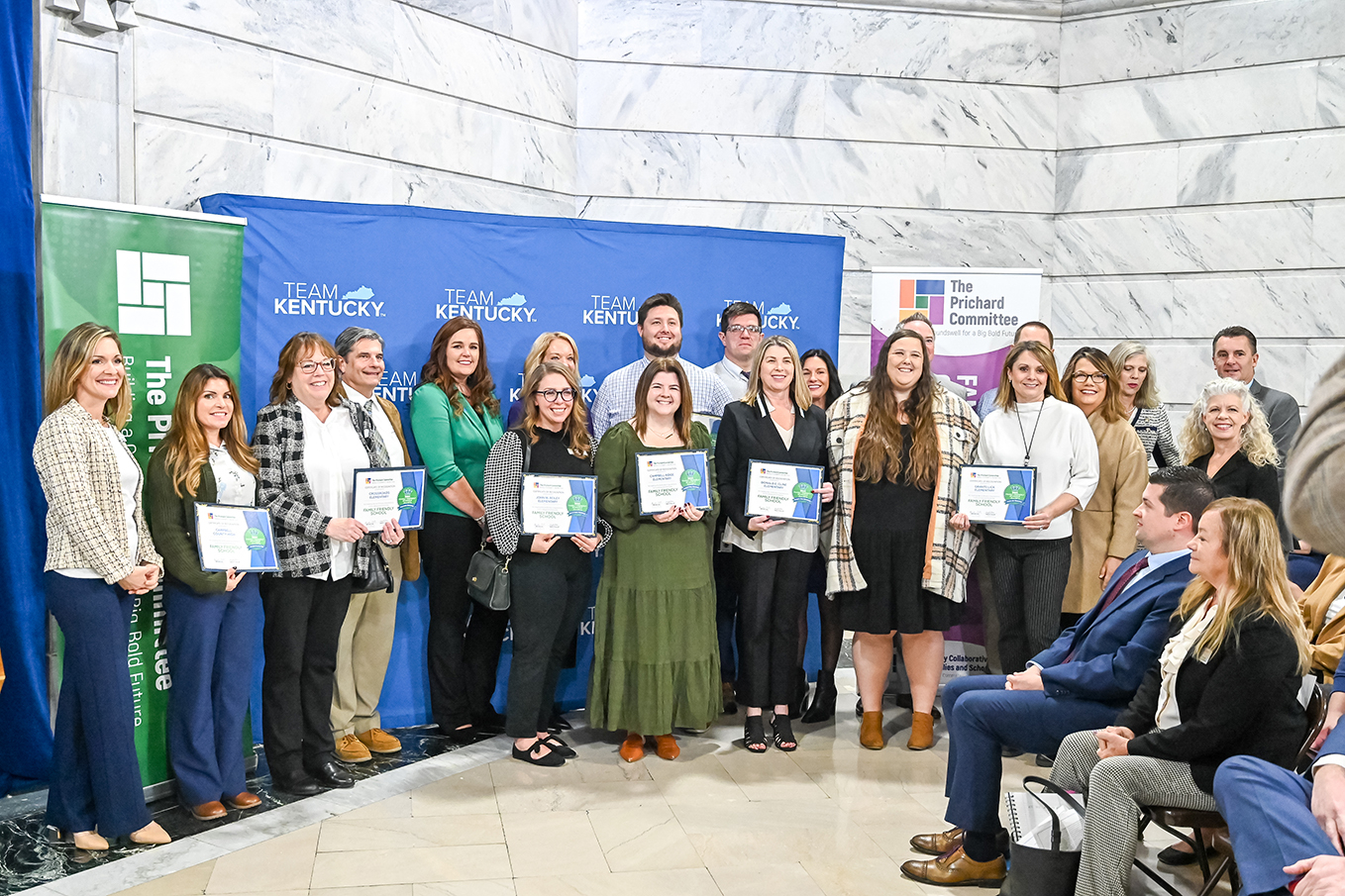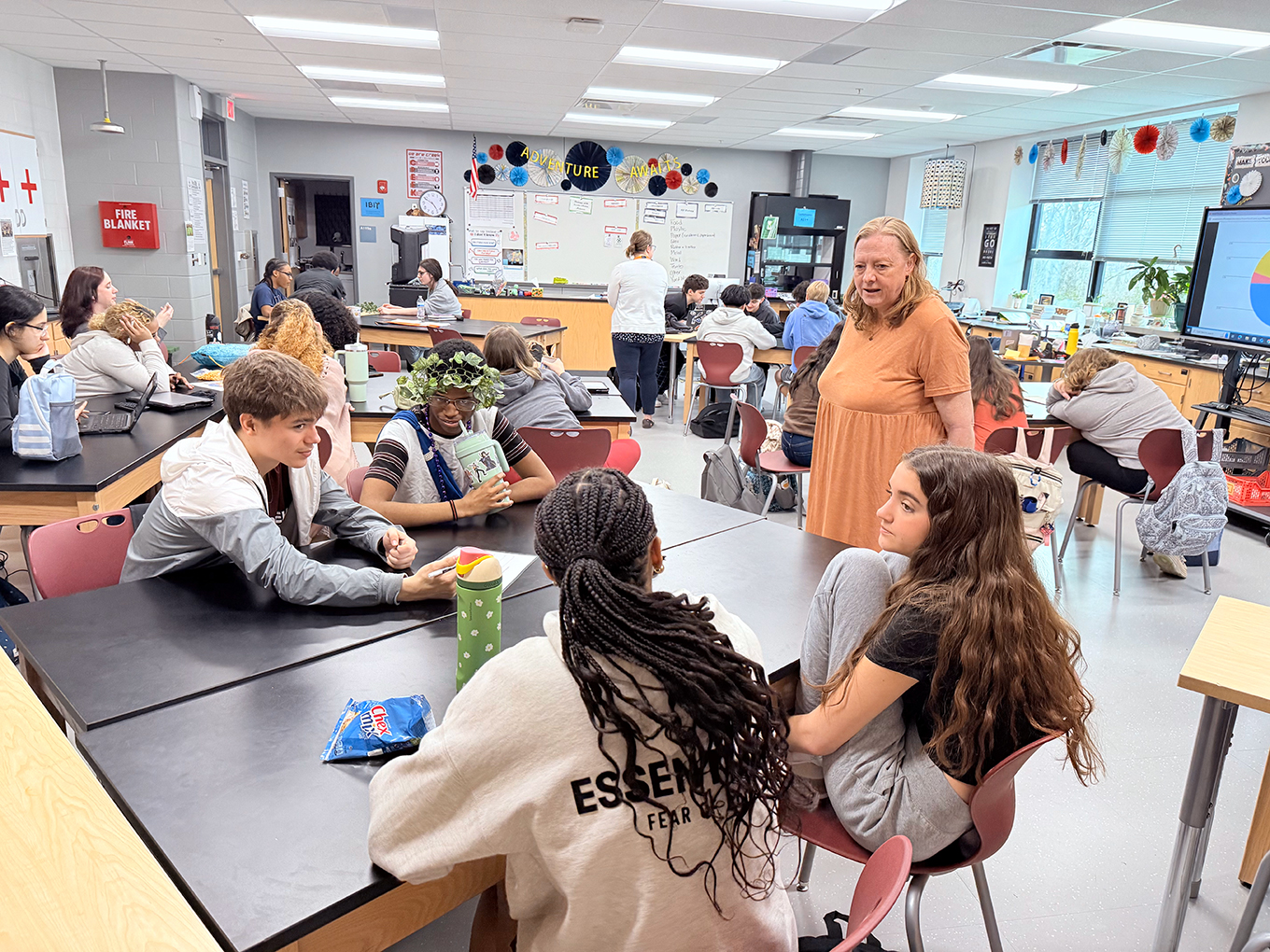
Kentucky Middle School Teacher of the Year Melanie Trowel helps Micah Lowe, Jayden Lydian and Anthony Wright with a graph analyzing daylight length and the angle of the sun during her 8th-grade science class at Carter G. Woodson Academy (Fayette County).
Photo by Amy Wallot, Nov. 6, 2013
U.S. Secretary of Education Arne Duncan said, “I believe that education is the civil rights issue of our generation. And if you care about promoting opportunity and reducing inequality, the classroom is the place to start.” This quote resonates with me as someone who was called to a career in teaching after spending time in West Louisville working with children . That experience changed the course of my life, redirecting me from medical school to the classroom. That same passion drives me 15 years later, as I continue to find ways to teach, motivate and activate the potential for excellence in my students at Carter G. Woodson Academy in Fayette County.
As teachers we know education is important. We spent countless hours preparing lessons, instructing and mentoring students and figure out new and creative ways to help them understand ideas and concepts. But sometimes, in the day to day hustle and bustle of the school day, I think we can lose sight of what why we do what, what our end goal is in all of our work. Quite simply we do it because our students’ futures depend on it. Having the knowledge and skills to succeed in the world they will face once they leave us have real and far-reaching implications for them when it comes to further education, career, health and overall quality of life.
If we as teachers care about our students and want them to succeed than we cannot ignore our role in laying the seeds for their future. We also cannot turn a blind eye to the existing achievement disparities among students based on race, gender, poverty and disability. These achievement gaps are not only a concern when we look at annual assessments. They are disparities we can see reflected in many social and economic issues in our society.
I am concerned about these statistics, and I believe as teachers we must do our part to help our students defy them and avoid paths to unemployment, poverty, prison and hopelessness. In Fayette County, the Equity Council monitors and analyzes equity issues, advises the Fayette County Board of Education and advocates for achievement for all students. The council’s Third Annual Equity Scorecard – which is a joint project developed by representatives from the council and Fayette County Public Schools – found that:
- African Americans students, which make up almost 23 percent of the student population, have the highest suspension rates. They also have the lowest achievement in math and reading on state assessments, the highest dropout rate, and are the least likely to be enrolled in Advanced Placement and International Baccalaureate classes.
- Only 5 percent of Hispanics are identified for Gifted and Talented services, and only 5.9% of the African Americans are identified for Gifted and Talented services.
- The free and reduced lunch subgroup consistently underachieved in all categories.
Under the leadership of Fayette County Superintendent Tom Shelton and the Equity Board, the school district has been very intentional in addressing how to achieve equitable outcomes for all students regardless of race, social economics, gender, and disability. Some important initiatives throughout our county include Positive Behavior Interventions and Support, Title 1 services, targeted efforts with low performing schools, Response to Intervention Framework, and Culturally Responsive Teaching and Learning. Fayette County also has implemented programs such as The Learning Center and Carter G. Woodson Academy, the all-boys academy where I teach that has a 99 percent African American enrollment. At Carter G. Woodson Academy, we say our “at promise” scholars are provided with a rigorous academic program.
You may wonder what this has to do with my being named the 2014 Kentucky Middle School Teacher of the Year. First, let me say I am greatly humbled to have been selected for this award. This honor is a reflection of so many educators and coaches who invested in me, and helped me see opportunities and realize my goals. My hope this year is to encourage other educators to discover or refine why they are called to teach, and at various times to act as surrogate parents, entertainers, counselors, disciplinarians, custodians and motivational speakers. May we always challenge ourselves as teachers to do what we can for our students regardless of any obstacles or challenges they bring to our classrooms. Begin with the end in mind. Where do we want to see our students 10 years, 20 years and what are you doing to help them get there? Let us teach for that better path for ALL students. May God bless all the seeds we lay in our students’ lives.
Melanie Trowel is the 2014 Middle School Teacher of the Year. She teaches science at the Carter G. Woodson Academy in Fayette County, and will write occasional columns for Kentucky Teacher during her year-long reign.









Leave A Comment